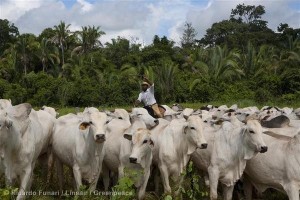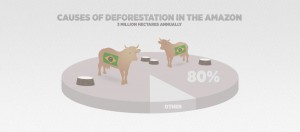Saving Wildlife by Eating Green
Aug 25th, 2014 | By admin | Category: Climate Change, FeaturedBy Suzanne York.
Changing the way we live, to better our lives or the environment, is not always an easy thing to do. Yet often times simple changes can amount to big differences.
Take eating less meat, for example. Eating less meat probably has a greater impact than changing to energy-saving light bulbs. You don’t have to become a vegetarian, but if you gave up meat a couple days a week, it would have an impact. Here in the U.S., we eat a lot of meat. And same with many countries around the world, and as people move up the economic ladder, they tend to eat a more meat-based diet.The Dish on Meat
But all that meat eating is detrimental to the planet. According to the Center for Biological Diversity (CBD), which this year launched a campaign toward reduced consumption of meat, meat production is responsible for more environmental degradation than any other single industry. Animal agriculture accounts for at least 14.5 percent — and, according to some studies, as much as 51 percent — of greenhouse gas emissions, 50 percent of antibiotic use and 37 percent of pesticide use. Livestock grazing is one of the greatest threats to imperiled species, affecting 14 percent of threatened or endangered animals and 33 percent of threatened or endangered plants.
Some other facts to consider:
Impacts of cattle – According to the FAO, cattle (raised for both beef and milk, as well as for inedible outputs like manure and draft power) are the animal species responsible for the most emissions, representing about 65% of the livestock sector’s emissions.
Deforestation – Clearing land for livestock is the biggest source globally of carbon dioxide from meat production, especially tropical forest, which is set to continue as long as demand for meat rises. Fly over the Brazilian Amazon and you’ll see what’s happening due to livestock demand. Cattle ranching represents 80% of deforestation in the Amazon.
Waste/Pollution – a meat (and dairy) intensive diet generates not only greenhouse gases but also large amounts of toxic manure and wastewater that pollute groundwater, rivers, streams and, ultimately, the ocean.
Not to be overlooked is the amount of habitat and biodiversity lost to the clearing of land for livestock and dairy production.
The Science on Meat and Climate
In 2012, researchers at Woods Hole Research Centre in Massachusetts released a report that found that meat eaters in developed countries will have to eat a lot less meat, cutting consumption by 50%, to avoid the worst consequences of future impacts of climate change.
And Rajendra Pachauri, former chair of the Intergovernmental Panel on Climate Change (IPCC), once suggested that eating less meat was one way to combat climate change, saying, “But if we’re honest, less meat is also good for the health, and would also at the same time reduce emissions of greenhouse gases.”
Consider what is entailed in getting that hamburger on the grill: meat production includes emissions generated from clearing forests and land, making and transporting fertilizer, burning fossil fuels in farm vehicles, and the front and rear end emissions from cattle and sheep.
Hold the Meat and Save Endangered Species
This Labor Day, a time when traditionally many Americans gather together for barbeques, offers a chance to opt for something other than grilled burgers, hot dogs, chicken, etc. CBD is promoting an extinction-free BBQ theme. The “sales pitch” is “Choose Veggies, Choose Wildlife.”
World of 9 Billion
No one wants to be told that they can’t eat what they want. But it can be very empowering to realize that just by eating less of something, in this case meat, you can make a contribution to saving the planet. As global population increases and people move up the economic ladder and eat more meat, holding the burger instead of the mayo more often will make a difference in a climate-constrained world.
Suzanne York is a senior writer with the Institute for Population Studies.



